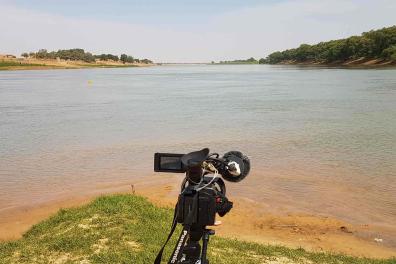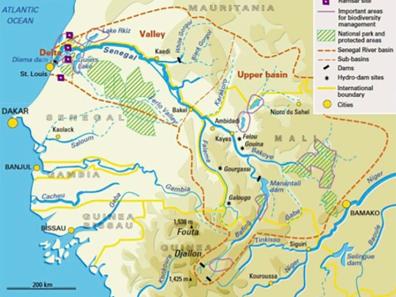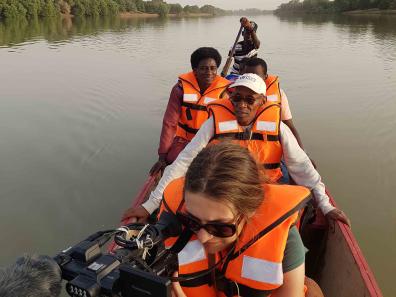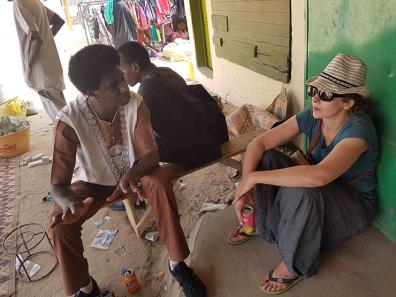Presentation of EcoSen "Pour une analyse écopoétique des littératures de la vallée du fleuve Sénégal" (ANR/City of Paris)

Fifteen people are involved in EcoSen: 4 teacher-researchers (geographers, literary scholars, anthropologists), 2 post-docs, 3 IT specialists, 2 administrative managers, 2 audiovisual technicians, 1 cartographer and 1 graphic designer. Responsible: Mélanie Bourlet.
The members involved come from four different universities and laboratories: Inalco - Llacan (Langage, langues et cultures d'Afrique noire, UMR 8135); Paris 8 Vincennes - Saint-Denis - Lavue (Laboratoire architecture, ville, urbanisme, environnement, UMR7218); Paris 10 Nanterre - Lesc (Laboratoire d'éthnologie et de sociologie comparative), Université d'Angers - Laboratoire Eso (Espaces et sociétés, UMR6590). We are also developing collaborations at several levels with Senegalese and Mauritanian partners and members of Fulani associations in France.
The aim of this project is to understand the existing links between literary productions in the Fulani language (oral but also written) - Pulaar, in this case - and the environment in the Senegal River valley (located in southern Mauritania and northern Senegal), in order to shed light on ecological poetics whose socio-political importance we postulate in this Sahelian zone. More broadly, the aim is to contribute to the advancement of interdisciplinary research in ecopoetics/ecocriticism (both theoretically and methodologically), and to establish the epistemological stakes for "voices" that are little recognized institutionally and in literary criticism, and little or not heard on major contemporary social issues.
The Senegal River valley: environmental changes and cultural mobilizations

The rural region where we work lies on the border between Senegal and Mauritania, between Dagana and Bakel. It is crossed from one end to the other by the Senegal River, whose flooding regime sets the pace for the entire life of the local population. A major historical center of Islam in West Africa, it has also been a geopolitical and economic issue in the sub-region since colonial times. Since the 1960s, it has undergone profound environmental changes (droughts, dam construction, deforestation, disappearance of animal and plant species) and societal changes (growing impoverishment, massive migrations in and out of Africa, etc.).
Parallel to the transformation of the landscape has been a growing awareness of political marginalization, and strong cultural demands supported by very dynamic Pulaar associations (nationally and internationally), carried largely by poets. The poetry of this region, whether sung or not, with instruments or not, highly appreciated and richly constituted of a myriad of sub-genres, remains insufficiently documented, even though it is intrinsically linked to the agro-sylvo-pastoral way of life of the local populations and remains highly listened to.
Our hypothesis is that there is a link - which has never been explored in a prioritized, truly interdisciplinary and in-depth way - between this Pulaar literature and environmental and geographical issues, which largely explains its resonance both locally and in the diaspora in a context of major changes (e.g. environmental migrations). This hypothesis is rooted in our most recent fieldwork on poetry (oral, written), by Marie Lorin (on the poetry of fishermen) and myself (on the poetry of Bakary Diallo), to which were added discussions with EcoSen geographers and anthropologists, which considerably nourished the reflection and gave it its definitive aspect.
.

This is why we are working to implement an interdisciplinary methodology in EcoSen, coupled with ongoing reflection on the tools (particularly with the project's computer scientists and audiovisual technicians, who are highly motivated by these challenges), ethical and collaborative stakes of our research. In concrete terms, in addition to individual fieldwork, we sometimes work in teams in the field. Humanly, scientifically, these are truly powerful experiences that enable researchers to exchange, feed off each other's experiences, and work in complementary ways. Since January 1, 2018, ten missions have been carried out.
The main outcome of the project (in addition to publications) is an open-access digital platform, which will be designed: 1/ both as an aesthetic experience of cartographic navigation in Senegal River poetry, making ample room for texts, artists, local (non-institutional) actors and researchers, collaborators, but also 2/ a terminological database, the fruit of collective work, which should be useful to researchers from all the disciplines involved. We hope to turn it into a free mobile application that will be very useful in the field.
Critical issues of EcoSen
The perspective adopted runs somewhat counter to the scientific view generally taken of these poetic genres, which has classified them according to social criteria, tending to freeze them and accentuate an ideological (and essentialist, This has tended to freeze them in place and accentuate an ideological (and essentialist) dimension, while relegating to the background that which links them, which crosses them and reveals not only a more fluid and complex social functioning, but also a whole poetic network in constant motion and animated by numerous artists, like the hydrographic network of this region. Yet it is precisely this background, scarcely explained in the editions available, that we believe to be the key to a dynamic to be deciphered that holds our attention in this project, and which we relate to what geographers, anthropologists and other researchers have done and are still doing.
What interests us are, of course, the representations of the environment, but more importantly, in the long run, the processes and dynamics at work in the texts, and what these forms reveal about the adaptability and societal stakes of literature, which we posit to be of paramount importance in current ecological reflections.
A tremendous opportunity has thus been afforded us to contribute to research in ecopoetics (or ecocriticism, which is concerned with the arts/ecology relationship), currently very much alive in France, starting from an African language and a literature with little institutional visibility, which is an opportunity above all for Fulani studies (since it has enabled us to recruit two young researchers) and African literatures.
However, we intend to seize upon the ecological paradigm, which currently seems to us to be one of the most fruitful critical avenues, to contribute as much as possible to a decompartmentalization of both literary studies and disciplines. Our aim is to integrate orality, and "minority" literatures in general, in their linguistic diversity, into a reflection that is not limited to foulanisants and cultural studies, but can be integrated into broader social debates and epistemological reflections, particularly in France, and invites real methodological openings and interdisciplinarity. That's why we've created an ecopoetics/ecocriticism course for undergraduates (as part of the Environment and Literature course) that acknowledges the diversity of forms of expression, languages and societal issues (including gender issues, with ecofeminism). Inalco is fortunate to be able to implement such courses.
Thus EcoSen, in addition to long-term work on site in Mauritania and Senegal, includes an axis designed to foster interdisciplinary collaborations and institutional reflections. The aim is above all to decompartmentalize this type of hyper-specialized research, which requires a different kind of timeframe (because it is time-consuming, tedious and requires fieldwork). Taking into account literatures other than written ones, and in European languages, is not a matter of course in theoretical reflection. Far from it. How can we contribute to making other voices heard, in all their singularity, in the teaching of literature? How can we make more room for the diversity of forms and languages? For us, this institutional question is fundamental, because these are difficulties we are directly confronted with. There's no point in denying them, or, on the contrary, withdrawing into our own territories, or adopting defensive or victimized postures. We need to be able to act together. Research is moving in this direction, and we are fully committed to this general movement: that of decompartmentalization and the ever-increasing networking of people. We need to think "institutional ecology" (cf. the day "Pour une écologie de la fragilité" organized with Emmanuel Lozerand on April 10, 2019) and from this point of view, Inalco's efforts, under the leadership of the Presidency, with the introduction of new cross-disciplinary courses, the think tank led by Hélène de Penanros around languages with small classes can only delight us, and we support these initiatives because the stakes are so high.
With this in mind, at the end of 2017, together with other academics, we created a collective called ZoneZadir to foster a transcultural, plurilingual ecopoetics dialogue, with the aim of getting to know each other better and sharing knowledge. On May 29, 2019, we're inviting American anthropologist Steven Feld to feed interdisciplinary thinking in a study day entitled "Ec(h)opoetics: singing, listening, experiencing places".
Finally, despite the current constraints on research, we believe that these projects, which are difficult to mount and obtain, should support young researchers in rare fields as much as possible and serve as a springboard. It's perfectly possible to show solidarity, to pay greater attention to professional weaknesses, to share and serve as a matrix for other research projects. It's a different way of doing research - more collaborative, more human, more collective, less individualistic - that we aspire to. Of course, it's an ideal, but we strongly believe in it and we're trying to put it into practice, in our own small way! And of course, we're ready to work with other colleagues in this direction. It's like with music (since we have an ethnomusicologist specializing in the music of the Senegal River on the team): the minor mode is there to set a major mode in variation...
Mélanie Bourlet
Lecturer in Peul language and literature at Inalco
Read also Mélanie Bourlet's portrait.
